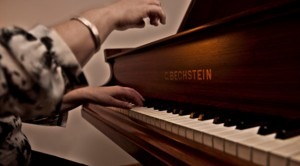
Credit: James Eppy
Every piece we learn will have its tricky or hard-to-master sections – that finger-twisting little passage, that scalic run which never feels comfortable under the hand, those hand-filling chords which are just a little bit too hard to reach accurately. For me it was arpeggios, a weakness in my technique which was making it more difficult for me to play the (many) arpeggios in Schubert’s sonata in A, D959, precisely and fluently. I knew I needed to do was to be able to play the passages automatically without the need to think about what was going on in the fingers and hands.
Musicians endlessly talk about training the “muscle memory”. Of course our muscles don’t really have memory, and the correct term for this is in fact “procedural memory”. This is part of our long-term memory that is responsible for knowing how to do things (also known as “motor skills”). Procedural memory retains information on how to perform certain procedures, such as walking, talking and riding a bike – and playing the piano. Procedural memory is created through “procedural learning” – repeating a complex activity over and over again until all of the relevant neural systems work together to automatically produce the activity. This is why as musicians we should be engaging in a hefty amount of repetitive practise, for it is these repetitions which fix the music in head and hands. Forget “practise makes perfect” – the real reasons why we do repetitive practise is because practise makes PERMANENT.
I was away from my own piano at the time when the arpeggios in the Schubert needed the most work, but as luck would have it, I had access to a digital piano which belonged to my husband’s niece. No matter that the keys were covered in a rather unpleasant sticky residue due to repeated use by small children: for three days I worked solely on arpeggios, focusing only on learning the correct sequence of notes and fingering. I did not consider the tone or quality of sound, or any of the more esoteric/artistic aspects of playing these sections; I simply concentrated on repeating the passages over and over and over again……
There are stories of pianists doing repetitive exercises or 100 repetitions of the same passage while reading a newspaper or reading aloud from a book. In these cases, one is training the procedural memory while testing one’s ability to divide one’s attention between several different tasks. I do this exercise with my students, getting them to repeat a section and once the repetitions begin to feel comfortable and well-known, I might ask them what they are having for dinner or what they are doing at the weekend. Given the amount of multi-tasking that is required in piano playing, this can be a very useful exercise.
The “note-bashing” exercise served its purpose: at the end of 10 days the sections were well-learnt and my attitude to them virtually intuitive. With such security comes confidence and the ability to play without physical tension or anxiety, resulting in a performance which was fluent and authoritative.
Schumann: Toccata in C Major, Op. 7
Sviatoslav Richter




